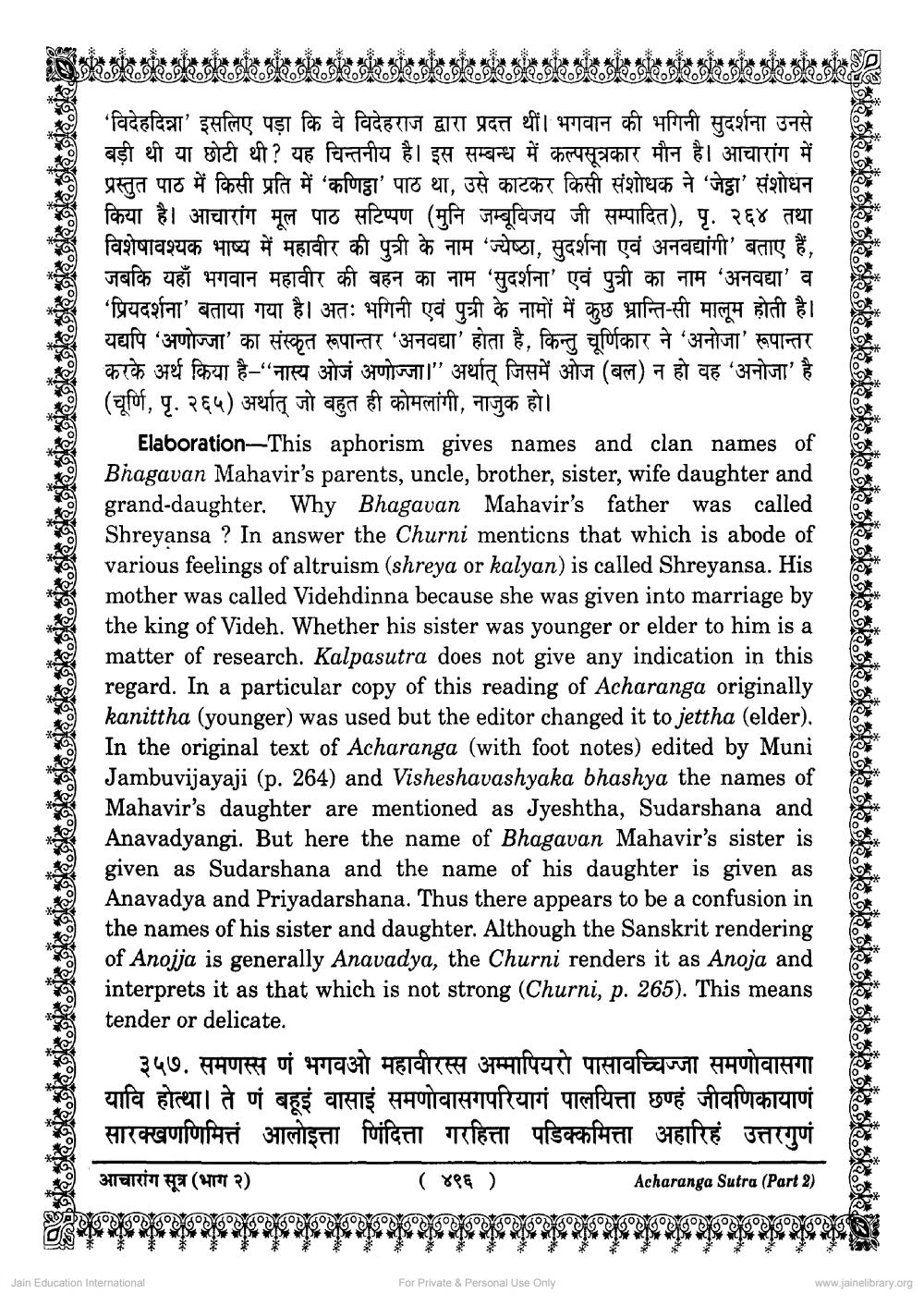________________
'विदेहदिन्ना' इसलिए पड़ा कि वे विदेहराज द्वारा प्रदत्त थीं। भगवान की भगिनी सुदर्शना उनसे बड़ी थी या छोटी थी ? यह चिन्तनीय है । इस सम्बन्ध में कल्पसूत्रकार मौन है। आचारांग में प्रस्तुत पाठ में किसी प्रति में 'कणिट्ठा' पाठ था, उसे काटकर किसी संशोधक ने 'जेट्ठा' संशोधन किया है। आचारांग मूल पाठ सटिप्पण ( मुनि जम्बूविजय जी सम्पादित), पृ. २६४ तथा विशेषावश्यक भाष्य में महावीर की पुत्री के नाम 'ज्येष्ठा, सुदर्शना एवं अनवद्यांगी' बताए हैं, जबकि यहाँ भगवान महावीर की बहन का नाम 'सुदर्शना' एवं पुत्री का नाम 'अनवद्या' व 'प्रियदर्शना' बताया गया है। अतः भगिनी एवं पुत्री के नामों में कुछ भ्रान्ति-सी मालूम होती है। यद्यपि 'अणोज्जा' का संस्कृत रूपान्तर 'अनवद्या' होता है, किन्तु चूर्णिकार ने 'अनोजा' रूपान्तर करके अर्थ किया है - "नास्य ओजं अणोज्जा ।" अर्थात् जिसमें ओज (बल) न हो वह 'अनोजा' है (चूर्णि, पृ. २६५) अर्थात् जो बहुत ही कोमलांगी, नाजुक हो।
Elaboration-This aphorism gives names and clan names of Bhagavan Mahavir's parents, uncle, brother, sister, wife daughter and grand-daughter. Why Bhagavan Mahavir's father was called Shreyansa? In answer the Churni mentions that which is abode of various feelings of altruism (shreya or kalyan) is called Shreyansa. His mother was called Videhdinna because she was given into marriage by the king of Videh. Whether his sister was younger or elder to him is a matter of research. Kalpasutra does not give any indication in this regard. In a particular copy of this reading of Acharanga originally kanittha (younger) was used but the editor changed it to jettha (elder). In the original text of Acharanga (with foot notes) edited by Muni Jambuvijayaji (p. 264) and Visheshavashyaka bhashya the names of Mahavir's daughter are mentioned as Jyeshtha, Sudarshana and Anavadyangi. But here the name of Bhagavan Mahavir's sister is given as Sudarshana and the name of his daughter is given as Anavadya and Priyadarshana. Thus there appears to be a confusion in the names of his sister and daughter. Although the Sanskrit rendering of Anojja is generally Anavadya, the Churni renders it as Anoja and interprets it as that which is not strong (Churni, p. 265 ). This means tender or delicate.
३५७. समणस्स णं भगवओ महावीरस्स अम्मापियरो पासावच्चिज्जा समणोवासगा यावि होत्था । ते णं बहूइं वासाइं समणोवासगपरियागं पालयित्ता छण्हं जीवणिकायाणं सारक्खणणिमित्तं आलोइत्ता निंदित्ता गरहित्ता पडिक्कमित्ता अहारिहं उत्तरगुणं
आचारांग सूत्र (भाग २)
( ४९६ )
Acharanga Sutra (Part 2)
Jain Education International
For Private Personal Use Only
www.jainelibrary.org




